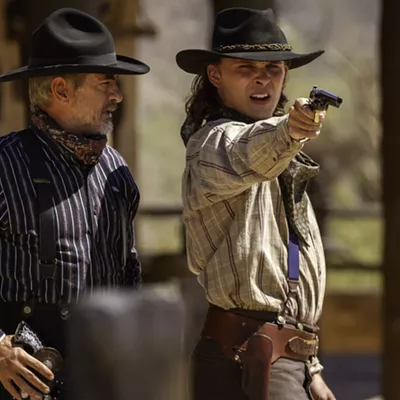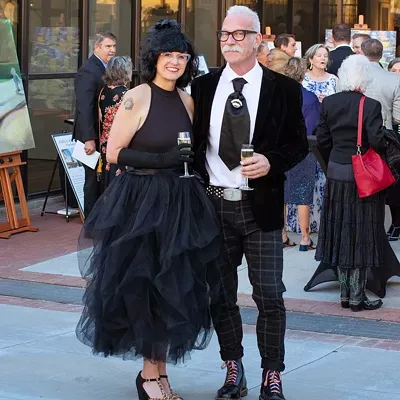"What a piece of work is a man."
No, that's not from Shakespeare's great tragedy Macbeth, currently bleeding across the Rogue Theatre stage. It's from Hamlet. But after watching the story of ambition, murder, revenge, guilt and retribution that is Macbeth, Hamlet's words come hauntingly to mind. As the characters and their stories confirm, we are definitely a piece of work.
The Rogue has embodied Shakespeare's play admirably. It's a dark piece; the language is sometimes hard on our ears; our minds and our senses are asked to handle a lot. But it's spellbinding. I challenge anyone who sees it—and invests what an audience member should invest—to walk away unaffected. Its intensity cannot be immediately dismissed; we find ourselves in an altered state. We are victims of its dark magic.
For those whose memory might be foggy about the story, here's a quick summary:
Macbeth is a much-honored and loyal subject of Duncan, King of Scotland. He seems to be a stand-up guy, ready to offer his services on battlefields as needed. But he's very susceptible to suggestion. He overhears some witches cavorting spookily in a clearing who predict he will be king, something he has no reason to believe. In addition, he has a wife who puts a bug in his ear that he deserves the power to rule the realm. Not only that, she suggests he has a perfect opportunity to do away with Duncan because the king and his entourage are guests in their home. Macbeth seems not totally sure that this is the proper way to treat one's guests, but between his ambition, his wife's encouragement and the witches' prophesy, he becomes convinced that this is his chance to claim what seems to be his fate. He steals into the bedroom and cuts Duncan's throat, but he doesn't leave his weapons behind. Lady Macbeth wants to be sure there's no evidence in her husband's possession that would convict him, so she takes his dagger back to the bloody site. Now, quite literally, they both have blood on their hands.
So begins the undoing of Macbeth and his Lady. The far-reaching consequences of what they have done, and what they themselves suffer as a result of their actions, are the stuff of the play.
Shakespeare has crafted a dense work, full of questions about morality and personal responsibility, about fate and choice, about how and why we succumb to our darkness even as we believe we are creatures of light. However, although the play is dense with ideas, they are embedded in features of great storytelling. Director Matt Bowdren has allowed his talented cast to discover and embellish these features to draw us into Shakespeare's tale and lead us on a mad journey.
Bowdren has had the help of skillful designers to create wonderful visual effects that engage and please us. Joseph McGrath's stately set can suggest numerous places. Cynthia Meier's costumes are fine, creating a sense of time and place as well as suggesting a character's status. The witches and their attire are scary in that alluring way by which we enjoy being scared and spooked, and their masks, by Aaron Cromie, are a great part of that effect. Not enough can be said about Deanna Fitzgerald's lighting design, which not only illuminates but suggests place and mood, both creating and underscoring the sense of what is happening moment to moment. Much credit is also due to Brent Gibbs who choreographed the numerous fights to be both effective and safe.
Jake Sorgen provides awesome sound and music too. His invention has become standard in Rogue productions. Here his work defines and gives depth to the story's unfolding in all its chaos and danger. He creates this for every performance, taking cues from what is happening on stage; so for timing purposes that means he must see everything going on, and here that means he must be onstage. Although they've found a way to make this happen without being too obtrusive, it presents a bit of a quirk visually. But Jorgen's contributions far outweigh the oddity.
The cast includes many we are familiar with on Rogue's stage, and, as a whole, the cast is strong with few weak performances. Joseph McGrath as Macbeth, Cynthia Meier as Lady Macbeth and Ryan Parker Knox as Macduff give fine readings of their characters. Matt Walley as Banquo and Claire Marie Manle as Ross do well, as does Sterling Boyns as Malcolm. David Weynand always handles Shakespeare's language so beautifully, and he contributes in several roles. (I'd like to see him have a crack as Macbeth someday.) Witches Holly Griffith, Grace Kirkpatrick and Claire Hancock are otherworldly and give rich context to what unfolds.
Macbeth is one of Shakespeare's most brilliant works, and in Rogue's production we see why. There are few missteps; perhaps the one most evident is that McGrath's take on Macbeth's transition to a mad man of blood in the second act is not as passionate and desperate as might be called for. We need to see, at least as subtext, a man becoming totally unglued as he loses wife and honor and the country for which he has sacrificed his integrity. This could be ramped up here.
But there is much is so much to see and hear and marvel at in Rogue's production that we are left stunned.






